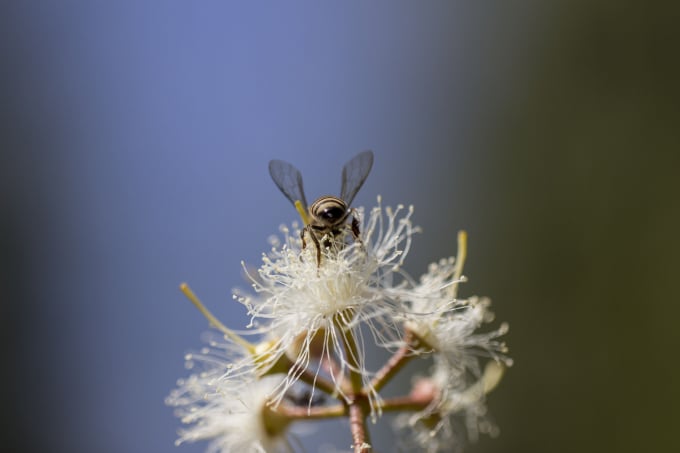November 27, 2025 | 23:46 GMT +7
November 27, 2025 | 23:46 GMT +7
Hotline: 0913.378.918
November 27, 2025 | 23:46 GMT +7
Hotline: 0913.378.918

We must act collectively to support, restore and enhance the role of bees. Photo: FAO/Zinyange Auntony
Hard-working little creatures, precious allies for the health of the planet and the lives of human beings, bees and other pollinators play a vital role in maintaining ecosystems, are critical for food production and livelihoods and directly link wild ecosystems with agricultural production systems. Almonds, apples, coffee, or strawberries are all foods that we can enjoy thanks to the meticulous pollination activities of bees and other pollinating insects. In addition to food, these insects indirectly contribute to the provision of medicines and the production of fiber, biofuels, and other materials.
So many gifts come from their tireless work, but bees and pollinators face many challenges today. The Food and Agriculture Organization of the United Nations (FAO) in celebration of World Bee Day 2022, warns of declining pollination services in many parts of the world.
“Bees, pollinators, and many other insects are declining in abundance due to unsustainable agricultural practices, pesticides, pests and pathogens, habitat destruction, and climate crisis," FAO Director-General QU Dongyu said in a video message at a ceremony on Friday to mark World Bee Day which falls on 20 May.
“We must act collectively to support, restore and enhance the role of bees, pollinators and beekeeping,” he added.
The virtual event was attended by bee and pollinator experts from around the world. It featured discussions and stories from the field that highlighted not only the great benefits of these tiny creatures for humans and nature but also the threats and challenges these insects face today due to humans’ negative impact on the environment.
This year's theme, "Bee engaged: celebrating the diversity of bees and beekeeping systems," encourages us all to become involved because we can all do something to respect and protect these insects that do so much for us. In their interventions at the FAO event, experts drew attention to the importance of the diversity bees and beekeeping systems that exist around the world.
Beekeeping is an activity that goes beyond honey production and contributes to the achievement of many Sustainable Development Goals (SDGs). Since it can be done with limited resources and locally available materials, beekeeping provides a source of income for those living in extreme poverty, helping to improve the resilience and livelihoods of rural and indigenous communities.
"Beekeeping is a widespread and global activity, with millions of beekeepers, including Indigenous Peoples, depending on bees for their livelihoods and well-being," the FAO Director-General stressed. Indeed, indigenous peoples are crucial to the conservation of important genetic reservoirs and are often the only ones who know about local bee species and all their products and services.
World Bee Day was established in 2017 through a United Nations resolution, following a proposal by the government of Slovenia. This year's event was again an opportunity to promote actions that governments, the private sector, organizations, civil society, and citizens can take to protect bees and other pollinators and their habitats, promote their diversity, and foster sustainable beekeeping practices.
FAO’s work
FAO and its partners are working to safeguard and support the role of bees and other pollinators and the communities that benefit from this through the Global Action on Pollination Services for Sustainable Agriculture; the goal is to build greater habitat diversity in agricultural and urban settings, promote policies that support biological pest control and limit pesticide use.
(FAO.org)

(VAN) A new study reveals how the simultaneous effects of ocean acidification, salinity and loss of oxygen are making the world more fragile.

(VAN) Hopes are growing that the creation of the first 3D turkey gut model could be a turning point in the battle against the virulent blackhead disease.

(VAN) Tyson, America’s biggest meat supplier, plans to shutter one of its largest beef processing plants as the industry continues to struggle with low cattle supplies and political pressure from Washington.

(VAN) New FAO study shows how digital solutions are empowering farmers and fishers to prevent losses and build resilient agrifood systems.

(VAN) Brazil's COP30 presidency pushed through a compromise climate deal on Saturday that would boost finance for poor nations coping with global warming but that omitted any mention of the fossil fuels driving it.

(VAN) Poultry farmers in the UK have been warned that they could face one of the worst winters yet for bird flu.

(VAN) Prices of main-crop paddy have risen sharply, with jasmine rice hitting 16,100 baht per tonne — the highest level in years.